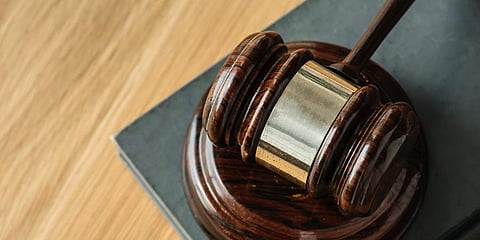

KOLKATA: The Calcutta High Court on Friday recommended that amendments be made to the Code of Criminal Procedure (CrPC) for incorporating provisions for trial in absentia of an absconding accused for better administration of criminal justice.
It set aside, as per the existing law, a lower court order that allowed deposition of a gang rape victim recorded during the trial of three other accused in the same case to be used against two absconding accused, who were arrested later.
A division bench presided by Justice Joymalya Bagchi was passing its judgement on a petition by Kader Khan, an accused in the infamous Park Street gangrape case of 2012, that challenged the trial court order allowing the prosecution to use deposition of the victim, who died in March 2015, against him during the trial.
He had absconded following the incident and was arrested in September 2016.
The high court said that section 299 of the CrPC provides for an exception to the ordinary rule that evidence in a criminal trial is to be recorded in presence of an accused and permits the evidence of a dead witness to be used against an absconder in a subsequent trial, but the prosecution has to obtain a prior direction from the trying court that the evidence of the witnesses is recorded against the absconder also.
"I am unable to agree with the trial Court that the deposition of the rape victim recorded in the course of earlier trial and her statement before the Magistrate exhibited therein, can be said to be admissible in the subsequent trial of the absconding petitioner," the bench observed.
The bench, also comprising Justice Bivas Pattanayak who concurred with Justice Bagchi's judgement, said that this unfortunate loss of valuable evidence of a rape victim arises due to the prevalence of an archaic law relating to the trial of absconders which does not recognise the evolution of law relating to waiver of fair trial rights of an absconder justifying trial in absentia and emergence of rights of victims, particularly victims of sexual abuse, against secondary victimisation by giving repeated depositions in court.
It observed that the discretion of the court to try an absconder in absentia, when exercised with due care and circumspection, cannot be said to be incompatible with common law or Article 6 of the European Convention of Human Rights.
Trial in absentia is also recognised in other common law countries, e.g.New Zealand, Canada under certain circumstances and categories of offences, the bench observed, adding that in Bangladesh also, section 339B of Bangladesh CrPC has been incorporated to provide for trial in absentia.
Noticing the alarming trend of abscondence was affecting delay in trials, the Supreme Court had in an order quoted section 339B of the Bangladesh CrPC and observed that appropriate authority may take cognizance of the said law, the division bench said.
In spite of such observation of the Apex Court no amendment has been made to Section 299(1) CrPC to provide for trial in absentia of an absconder which may avoid unfortunate loss of valuable evidence due to death of a witness as in the present case.
The bench directed the Registrar General of the high court to send a copy of the judgment to the principal secretaries to the Ministry of Home Affairs and Ministry of Law and Justice, Union of India for consideration of the proposal.
The bench said that section 299 of the CrPC is not only an exception to the ordinary rule that evidence in a criminal trial is to be recorded in presence of an accused but also carves out an exception to the general rule of relevancy engrafted in section 33 of the Evidence Act and permits the evidence of a dead witness to be used against an absconder in a subsequent trial although the absconder did not have opportunity to cross-examine such witness in the earlier proceeding.
The bench said that if the evidence is so recorded against the absconder, it may be used against him in the subsequent trial upon his arrest if the witness is dead or incapable of giving evidence or is not found.
The bench noted that in the present case, the prosecutor did not make any prayer before the trial court during the earlier trial of the co-accused persons that the prosecution evidence recorded in the said trial be also recorded against the absconder.